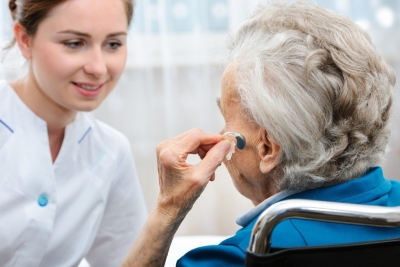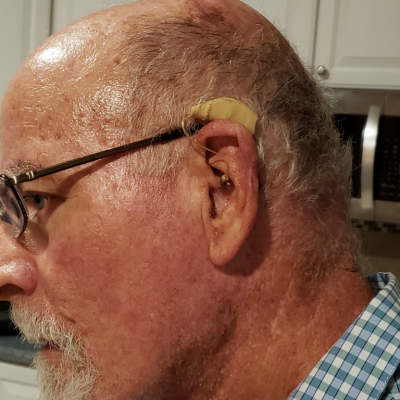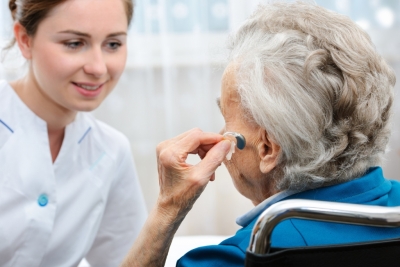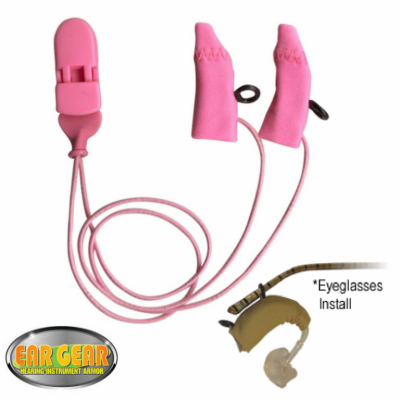When our loved ones reach the point in their lives where a nursing home is needed, it can bring numerous concerns. We hope that their nutrition is being looked after, safety is the toppriority, and that every one of their needs is being acknowledged including maintenance of hearing aids, making sure that they're worn every day and don't get lost.

Urgent needs such as medical emergencies and hygiene take precedence. Hearing aids and their maintenance are often put on the back burner. Preventing the loss of hearing aids can also be difficult in a home with hundreds of residents and staff.
Many seniors living in nursing homes or assisted living environments do require a hearing instrument but most times, the nursing staff isn’t even aware of the hearing impairment. They haven’t actually seen the resident wear hearing aids so they assume all is fine. Residents in assisted living may even have a tendency to refuse to wear their hearing aids resulting in frustration from both the nursing staff and the resident.
Some reasons residents may refuse to wear the hearing instruments are:
- Poor fit
- Painful to wear
- Difficult to use by themselves and help is unavailable
- Batteries are dead or they are not functioning properly
The staff should be aware of these issues when it comes to hearings devices and trained on how to deal with them. A senior may feel very lost, isolated and frustrated without their hearing instruments. It can even complicate other issues such as dementia.
Hearing screenings are also very important. If the hearing impairment has changed, the hearing aid may not be functioning as well as it could for the resident.
It does take an effort to maintain hearing instruments and to ensure residents are wearing them.
This is going to be a team effort.
You cannot rely solely on the nursing staff for all the attention and effort it takes to maintain hearing aids. Develop a positive relationship with the staff and talk to them about what your loved one needs.
Nursing homes can get very busy. Shuffling residents around to make room for new ones, taxis and ambulances for outside medical appointments and day trips, plus visitors can all add to the chaos. Eyeglasses, dentures and hearing aids all go missing in this hustle and bustle.
When these expensive items do disappear, who is responsible? You’ll have to do some research on how your particular nursing home, state, province or area decides this responsibility.
Fortunately, there are some things you can do to prevent losing hearing aids in the nursing home:
Retention device
Ear Gear is an acoustically transparent sleeve that fits right over the hearing instruments. It is available in corded models along with a clip that secures the hearing aids to the clothing. This greatly reduces loss and is extremely useful around the nursing home or on day trips where it would be even more difficult to retrace steps.
Labels
Write the initials or name in a permanent marker on the hearing aids. You could also use tiny stickers that are shiny. These attract the eye when the light hits them. Try painting the hearing aids with a bright color so they’re easier to spot on the floor or in bedding. Ear Gear is easier than dealing with paint as it comes in many bright colors and even custom fabrics to match the personality of the wearer.
Storage
A small plastic case (or Dry & Store) by the bedside is a handy and safe place to store hearing aids. Some seniors tend to wrap hearing aids in tissue thinking this will protect them. Since the hearing aids are so lightweight they can easily wind up in the trash. Talk to your nursing staff about checking tissues for hidden hearing aids before throwing them out.
Maintenance
Nursing staff are busy people. Ideally, they would have the time to label each hearing aid, clean them, store them, and check the batteries on a regular basis. Family members play an important role in maintaining hearing instruments. Keep the hearing devices clean and moisture free with Ear Gear products, use a soft toothbrush every once in a while to clean out debris, check the batteries weekly, and arrange a hearing screening with an audiologist. If needed, ask the audiologist for training in how to deal with the hearing instruments.
Talk to the nursing staff and understand their policies on hearing aids, the maintenance of the devices and who’s responsible if a loss were to occur. Ask if you can show them how to put on mom or dad’s hearing aids. Make sure they know tissues are the go-to storage for your family member's hearing aids and supply a container as storage. Write down the model, make and serial number for the nursing home to prevent hearing aids from being swapped unintentionally and to have on file if they do go missing. Supply the staff with a couple pairs of Ear Gear. They will appreciate this as Ear Gear not only prevents loss but also moisture and dirt from getting into the hearing aid due to sweat, baths and day to day wear and tear. It is the most inexpensive insurance you can buy to prevent loss of hearing aids in the nursing home.
The most important thing you can do for your loved one is to become an advocate for their care and that includes their hearing. Left unattended, hearing loss and the refusal or inability to wear hearings aids will cause more problems in the end. Keep those hearing instruments clean, well functioning and in the ears where they belong.
To buy Ear Gear, please visit our page here. We can ship directly to the nursing home of your choice. We provide installation instructions to assisted living and nursing professionals along with free brochures and samples for informing the residents' families of Ear Gear's unique hearing aid retention device.





